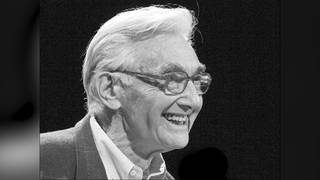
This week President Trump described the work of the legendary historian Howard Zinn, who died in 2010, as “propaganda” meant to “make students ashamed of their own history.” But Zinn believed the opposite, that teaching the unvarnished truth about history was the best way to combat propaganda and unexamined received wisdom. We air excerpts from a 2009 interview with Zinn in which he explained his approach to education. “We should be honest with young people; we should not deceive them. We should be honest about the history of our country,” Zinn said.
Transcript
AMY GOODMAN: We end today’s show with the words of the late historian Howard Zinn. On Thursday, President Trump lashed out at educators who teach about the U.S. history of slavery and racism, announcing a so-called patriotic education plan to combat what he called “toxic propaganda” in schools. Trump called the teaching of critical race theory a “form of child abuse,” lashed out at the 1619 Project, the Pulitzer Prize-winning series by The New York Times which reexamines the legacy of slavery. Trump also directly criticized Howard Zinn during his speech at the National Archives Museum in Washington, D.C.
PRESIDENT DONALD TRUMP: The left-wing rioting and mayhem are the direct result of decades of left-wing indoctrination in our schools. It’s gone on far too long. Our children are instructed from propaganda tracts, like those of Howard Zinn, that try to make students ashamed of their own history.
AMY GOODMAN: So, we’re turning back now to 2009, Howard Zinn appearing on Democracy Now! less than a year before he died. He just published A Young People’s History of the United States. I asked him to respond to a question he had frequently been asked about his work: Is it right to be so critical of the government’s policies, of the traditional heroes of the country?
HOWARD ZINN: It’s true that people have asked that question again and again. You know, should we tell kids that Columbus, whom they have been told was a great hero, that Columbus mutilated Indians and kidnapped them and killed them in pursuit of gold? Should we tell people that Theodore Roosevelt, who is held up as one of our great presidents, was really a warmonger who loved military exploits and who congratulated an American general who committed a massacre in the Philippines? Should we tell young people that?
And I think the answer is: We should be honest with young people; we should not deceive them. We should be honest about the history of our country. And we should be not only taking down the traditional heroes like Andrew Jackson and Theodore Roosevelt, but we should be giving young people an alternate set of heroes.
Instead of Theodore Roosevelt, tell them about Mark Twain. Mark Twain — well, Mark Twain, everybody learns about as the author of Tom Sawyer and Huckleberry Finn, but when we go to school, we don’t learn about Mark Twain as the vice president of the Anti-Imperialist League. We aren’t told that Mark Twain denounced Theodore Roosevelt for approving this massacre in the Philippines. No.
We want to give young people ideal figures like Helen Keller. And I remember learning about Helen Keller. Everybody learns about Helen Keller, you know, a disabled person who overcame her handicaps and became famous. But people don’t learn in school and young people don’t learn in school what we want them to learn when we do books like A Young People’s History of the United States, that Helen Keller was a socialist. She was a labor organizer. She refused to cross a picket line that was picketing a theater showing a play about her.
And so, there are these alternate heroes in American history. There’s Fannie Lou Hamer and Bob Moses. There are the heroes of the civil rights movement. There are a lot of people who are obscure, who are not known. We have it in this Young People’s History. We have a young hero who was sitting on the bus in Montgomery, Alabama, refused to leave the front of the bus. And that was before Rosa Parks. I mean, Rosa Parks is justifiably famous for refusing to leave her seat, and she got arrested, and that was the beginning of the Montgomery Bus Boycott and really the beginning of a great movement in the South. But this 15-year-old girl did it first. And so, we have a lot of — we are trying to bring a lot of these obscure people back into the forefront of our attention and inspire young people to say, “This is the way to live.”
AMY GOODMAN: That’s Howard Zinn appearing on Democracy Now! in 2009. Howard Zinn was attacked by President Trump on Thursday. The Zinn Education Project criticized Trump’s call for “patriotic education.” The project tweeted, “So what explains the rebellions in 1676, 1680, 1786, 1831, 1859, & more by Native Americans, enslaved Africans, coal miners, & more? #HowardZinn wasn’t alive then,” unquote.
To see our full interview with Howard Zinn, you can go to democracynow.org, as well as all of our interviews with Howard Zinn over the years.
And that does it for our broadcast. Democracy Now! is produced with Renée Feltz, Mike Burke, Deena Guzder, Libby Rainey, Nermeen Shaikh, María Taracena, Carla Wills, Tami Woronoff, Charina Nadura, Sam Alcoff, Tey-Marie Astudillo, John Hamilton, Robby Karran, Hany Massoud and Adriano Contreras. Our general manager is Julie Crosby. Special thanks to Becca Staley, Miriam Barnard, Paul Powell, Mike DiFilippo, Miguel Nogueira, Hugh Gran, Denis Moynihan, David Prude. I’m Amy Goodman. Thanks so much for joining us.













Media Options